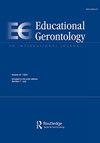老年人比许多人预期的更健康:减少了反老的态度
IF 1.5
4区 教育学
Q3 EDUCATION & EDUCATIONAL RESEARCH
引用次数: 0
摘要
本文章由计算机程序翻译,如有差异,请以英文原文为准。
Older adults are healthier than many people expect: reducing anti-old attitudes
ABSTRACT There are widespread anti-old attitudes held by younger people. Older adults are generally perceived as closely associated with illnesses. Thus, younger people with a higher degree of germ aversion (i.e. aversion to disease transmission) are thought to view the older population more negatively. In Study 1, we conducted an online survey (N = 981) and found that, even after controlling for the related variables such as fear of death, those with higher germ aversion had more anti-old attitudes. In Study 2, we conducted an online experiment (N = 689). Participants in the experimental group read an explanatory text which showed that older adults in general are healthier than people perceive and those in the control group read an irrelevant explanatory text. Results showed that anti-old attitudes were weaker in the experimental group than in the control group; this effect lasted at least one week. In Study 3, we conducted an online experiment similar to Study 2 (N = 997). In the experimental group, anti-old attitudes toward both the young-old (aged 65–74 years) and old-old (aged 75 years and over) were reduced. Further, advocates for policies to support older adults increased in the experimental group. The experimental manipulation in this study has the advantage that it can be conducted with a large number of participants in a simple procedure. Our findings would be useful in gerontological research aimed at improving anti-old attitudes and creating a society, in which older adults can live comfortably.
求助全文
通过发布文献求助,成功后即可免费获取论文全文。
去求助
来源期刊

Educational Gerontology
Multiple-
CiteScore
2.50
自引率
13.30%
发文量
80
期刊介绍:
This well-respected journal offers up-to-date original research in the fields of gerontology, adult education, and the social and behavioral sciences. Researchers from around the world will benefit from the exchange of ideas for both the study and practice of educational gerontology. Papers published in the journal will also serve as authoritative contributions to the growing literature in this burgeoning field. Educational Gerontology is the only international journal of its kind to publish twelve issues per volume year. Articles featuring outcome-based practical educational resources in gerontology for the educational professional, care provider, trainer, and student in such areas as: art, music, drama and recreational therapies; mental health, communication arts, social programs and policies; and, social work, nursing, physical and occupational therapies, financial planners, architecture and interior design, family relations and therapy, and religion and spirituality.
 求助内容:
求助内容: 应助结果提醒方式:
应助结果提醒方式:


